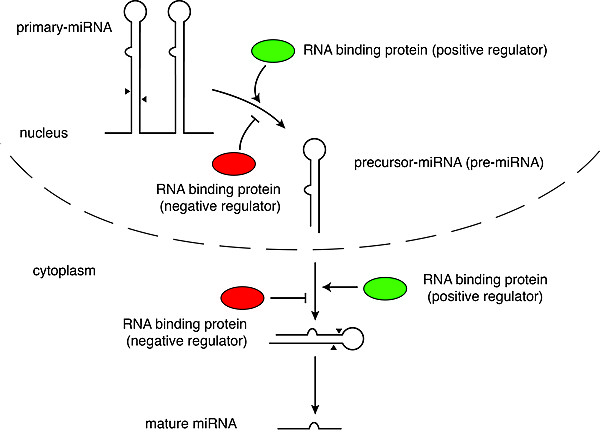Role of RNA-binding proteins in microRNA function
Team: Giulia Felician, Anne Dueck, Lucia Koblitz, Urszula Kremser
MicroRNAs are small non coding RNAs, important negative regulators of gene expression in all life stages of eukaryotic organisms, with well described roles in cell homeostasis, development, cancer and several other diseases.
MicroRNAs are transcribed into long precursors, which are enzymatically processed to 20-23 nucleotide-long mature form. The canonical processing pathway leading to mature microRNAs has been deeply characterized, but recent evidences identified a role of RNA binding proteins as processing regulators of specific microRNAs (Michlewski G. et al., Mol. Cell, 2008).
Such RNA binding proteins have been found to inhibit or favor the processing of the microRNA precursor toward the mature form. Interestingly, while the canonical steps of microRNA processing are performed by the same complexes for all the microRNAs (Drosha and Dicer complex), RNA binding proteins able to modify microRNA processing display a higher specificity (Slezak-Prochazka I. et al., RNA, 2010; Newmann M. and Hammond S., Genes and Dev., 2010).
Our team identifies RNA binding proteins in the context of microRNA regulation and characterizes their function in primary cardiomyocytes. To determine the impact of specific RNA binding proteins on cardiac diseases in vivo, we manipulate their expression by cell-targeted approaches, using optimized viral vectors and genetic knockout strategies.
References:
Michlewski G. et al., Mol Cell. 2008.
Slezak-Prochazka I. et al., RNA. 2010.
Newmann M. and Hammond S., Genes and Dev. 2010.
